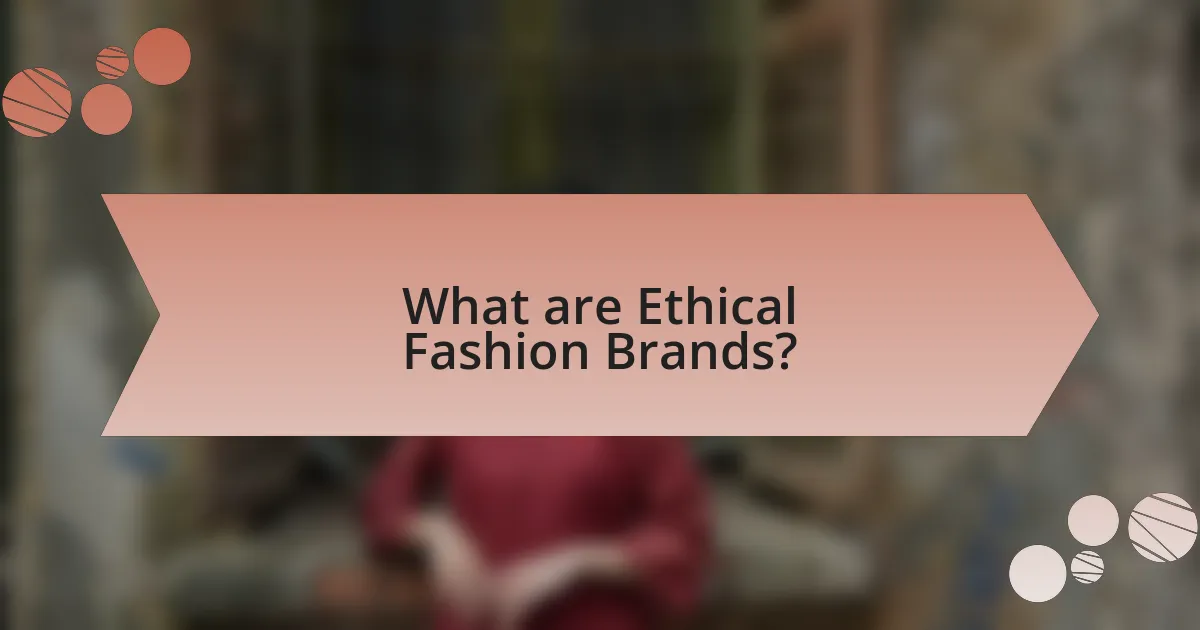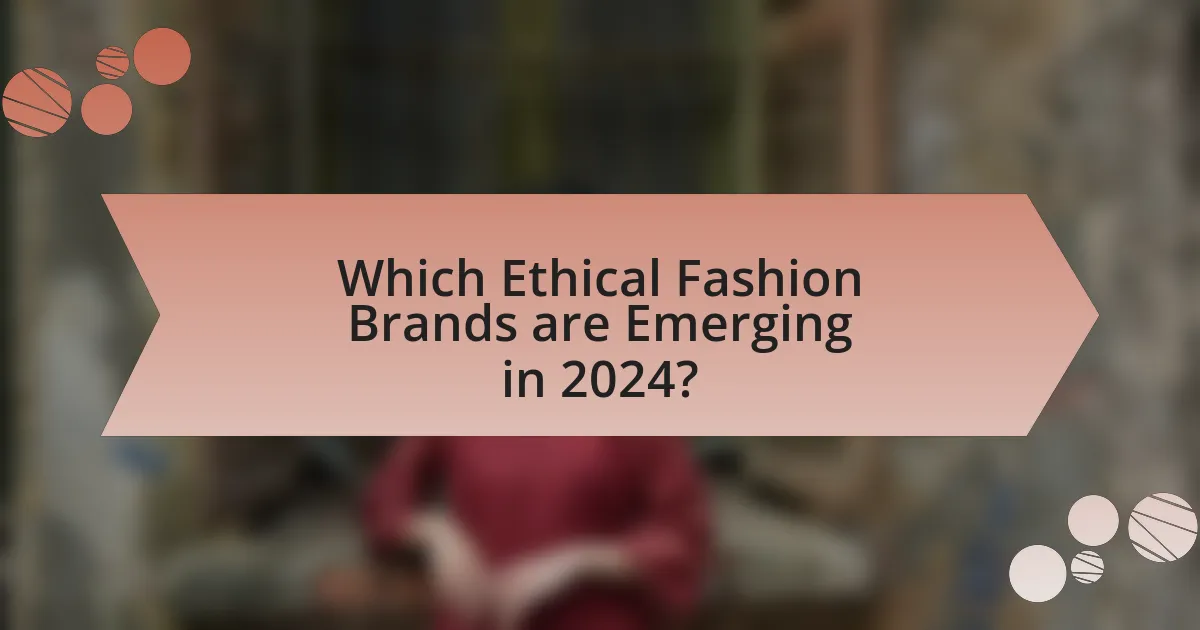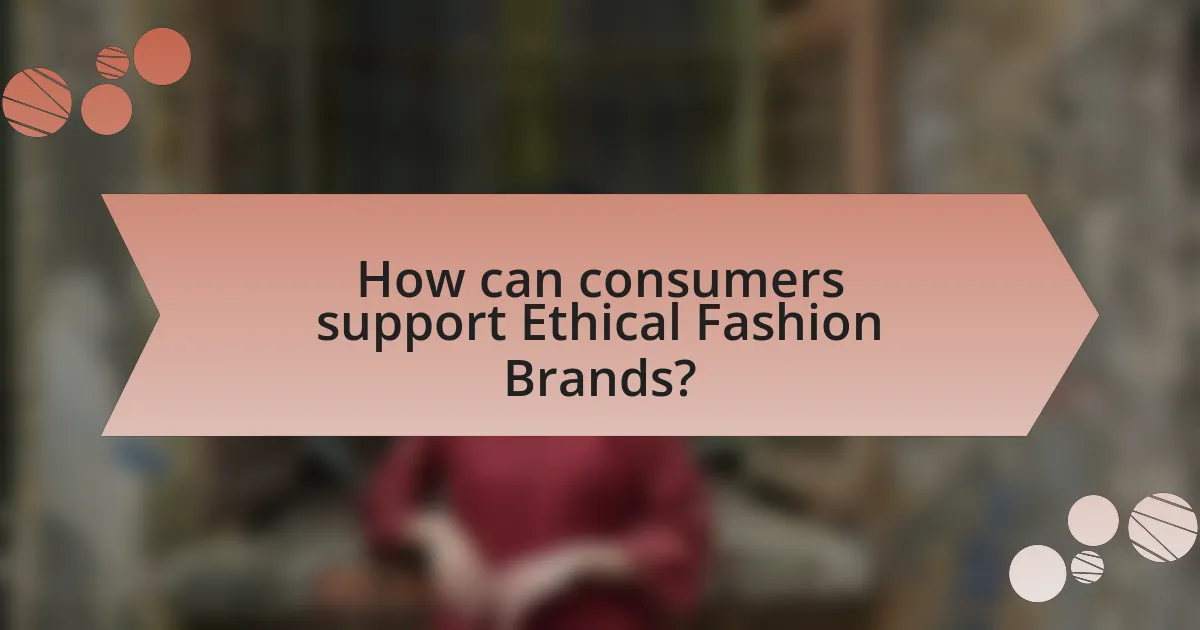Ethical fashion brands are companies that emphasize sustainability, fair labor practices, and environmentally friendly materials in their production processes. This article explores the differences between ethical and traditional fashion brands, highlighting key principles such as transparency and animal welfare. It discusses the importance of sustainability in fashion, the characteristics of ethical brands, and emerging trends for 2024, including innovative approaches to design and production. Additionally, it addresses consumer behaviors driving the growth of ethical fashion, challenges faced by these brands, and practical tips for consumers to support ethical practices in their shopping habits.

What are Ethical Fashion Brands?
Ethical fashion brands are companies that prioritize sustainability, fair labor practices, and environmentally friendly materials in their production processes. These brands aim to reduce the negative impact of the fashion industry on the planet and its workers by ensuring that their products are made under conditions that respect human rights and promote ecological balance. For instance, brands like Patagonia and Eileen Fisher are known for their commitment to using organic materials and supporting fair trade practices, which exemplifies the principles of ethical fashion.
How do Ethical Fashion Brands differ from traditional fashion brands?
Ethical fashion brands differ from traditional fashion brands primarily in their commitment to sustainability and social responsibility. Ethical fashion brands prioritize environmentally friendly materials, fair labor practices, and transparency in their supply chains, whereas traditional fashion brands often focus on maximizing profit, sometimes at the expense of ethical considerations. For instance, a report by the Ethical Fashion Forum indicates that ethical brands typically use organic or recycled materials, reducing environmental impact, while traditional brands may rely on cheaper, non-sustainable fabrics. Additionally, ethical brands often ensure fair wages and safe working conditions for their workers, contrasting with the exploitative labor practices sometimes found in traditional fashion manufacturing.
What principles define ethical fashion?
Ethical fashion is defined by principles such as sustainability, fair labor practices, transparency, and animal welfare. Sustainability focuses on minimizing environmental impact through eco-friendly materials and production processes. Fair labor practices ensure that workers receive fair wages and safe working conditions, as evidenced by organizations like the Fair Trade Foundation, which certifies brands that adhere to these standards. Transparency involves clear communication about sourcing and manufacturing processes, allowing consumers to make informed choices. Lastly, animal welfare principles advocate for cruelty-free practices in the fashion industry, promoting the use of alternative materials that do not harm animals.
Why is sustainability important in fashion?
Sustainability is important in fashion because it addresses environmental degradation, social inequality, and economic viability within the industry. The fashion industry is responsible for approximately 10% of global carbon emissions and is a major contributor to water pollution and waste. By adopting sustainable practices, brands can reduce their ecological footprint, promote fair labor practices, and ensure long-term economic health. For instance, the use of organic materials and ethical labor practices not only minimizes environmental impact but also supports communities, as seen in brands like Patagonia and Eileen Fisher, which prioritize sustainability in their business models.
What are the key characteristics of Ethical Fashion Brands?
Ethical fashion brands are characterized by their commitment to sustainability, fair labor practices, and transparency in their supply chains. These brands prioritize environmentally friendly materials, such as organic cotton and recycled fabrics, which reduce their ecological footprint. They also ensure fair wages and safe working conditions for their workers, often adhering to certifications like Fair Trade. Transparency is another key characteristic, as ethical fashion brands openly share information about their sourcing and production processes, allowing consumers to make informed choices. For example, brands like Patagonia and Everlane exemplify these principles by promoting responsible manufacturing and ethical labor practices.
How do these brands ensure fair labor practices?
These brands ensure fair labor practices by implementing strict codes of conduct for their suppliers, conducting regular audits, and promoting transparency in their supply chains. For instance, many ethical fashion brands require their manufacturers to adhere to international labor standards, which include fair wages, safe working conditions, and the prohibition of child labor. Additionally, brands often publish their audit results and supplier lists, allowing consumers to verify their commitment to ethical practices. This approach not only fosters accountability but also encourages continuous improvement in labor conditions across the industry.
What materials do Ethical Fashion Brands typically use?
Ethical fashion brands typically use sustainable materials such as organic cotton, Tencel, hemp, recycled polyester, and linen. These materials are chosen for their lower environmental impact and reduced use of harmful chemicals during production. For instance, organic cotton is grown without synthetic pesticides, while Tencel, made from sustainably sourced wood pulp, uses a closed-loop process that recycles water and solvents. Additionally, recycled polyester diverts plastic waste from landfills, contributing to a circular economy.

Which Ethical Fashion Brands are Emerging in 2024?
Emerging ethical fashion brands in 2024 include brands like Reformation, known for its sustainable practices and eco-friendly materials, and Pangaia, which focuses on innovative textiles and environmental responsibility. Additionally, brands such as Toms, which has expanded its commitment to social impact, and Allbirds, recognized for its sustainable footwear, are gaining traction. These brands are increasingly adopting transparent supply chains and sustainable production methods, aligning with consumer demand for ethical practices in the fashion industry.
What are some notable Ethical Fashion Brands to watch this year?
Some notable ethical fashion brands to watch in 2024 include Reformation, known for its sustainable practices and transparency, and Patagonia, which emphasizes environmental activism and responsible sourcing. Additionally, Eileen Fisher focuses on circular fashion and fair labor practices, while Allbirds is recognized for its eco-friendly materials and carbon neutrality. These brands exemplify commitment to ethical standards, as evidenced by their certifications and initiatives aimed at reducing environmental impact and promoting social responsibility.
What unique approaches do these brands take towards sustainability?
These brands adopt unique approaches to sustainability by integrating innovative materials, ethical labor practices, and circular economy principles. For instance, some brands utilize recycled fabrics and biodegradable materials to minimize environmental impact, while others focus on transparent supply chains that ensure fair wages and safe working conditions for workers. Additionally, several brands implement take-back programs that encourage customers to return used products for recycling or repurposing, thereby reducing waste. These strategies collectively contribute to a more sustainable fashion industry, aligning with growing consumer demand for ethical practices.
How are these brands innovating in design and production?
These brands are innovating in design and production by integrating sustainable materials and advanced technologies into their processes. For instance, many ethical fashion brands are utilizing organic cotton, recycled polyester, and innovative fabrics made from waste materials, which significantly reduce environmental impact. Additionally, brands are adopting 3D printing and digital design techniques to minimize waste and enhance customization, allowing for more efficient production cycles. This shift not only meets consumer demand for sustainable practices but also aligns with industry trends towards circular fashion, where products are designed for longevity and recyclability.
What trends are shaping the Ethical Fashion landscape in 2024?
In 2024, the Ethical Fashion landscape is being shaped by increased consumer demand for transparency, sustainable materials, and circular fashion practices. Consumers are increasingly prioritizing brands that disclose their supply chains and production processes, leading to a rise in certifications and third-party audits. Additionally, the use of eco-friendly materials, such as organic cotton and recycled fabrics, is becoming standard as brands seek to minimize their environmental impact. Circular fashion, which emphasizes recycling and upcycling, is gaining traction as companies implement take-back programs and design for longevity. These trends are supported by a growing body of research indicating that 66% of global consumers are willing to pay more for sustainable brands, highlighting the shift towards ethical consumption.
How is technology influencing Ethical Fashion Brands?
Technology is significantly influencing ethical fashion brands by enhancing transparency, improving supply chain management, and enabling sustainable practices. For instance, blockchain technology allows brands to trace the origin of materials, ensuring ethical sourcing and reducing fraud. Additionally, advancements in artificial intelligence and data analytics help brands optimize production processes, minimizing waste and energy consumption. According to a report by McKinsey & Company, 66% of consumers are willing to pay more for sustainable brands, indicating that technology-driven transparency can lead to increased consumer trust and loyalty.
What consumer behaviors are driving the growth of ethical fashion?
Consumer behaviors driving the growth of ethical fashion include increased awareness of sustainability, demand for transparency in supply chains, and a preference for brands that align with personal values. Consumers are increasingly prioritizing eco-friendly materials and ethical labor practices, leading to a shift in purchasing decisions. According to a 2021 survey by McKinsey & Company, 67% of consumers consider the use of sustainable materials important when making fashion purchases, highlighting the significant impact of environmental concerns on consumer choices. Additionally, the rise of social media has amplified the visibility of ethical brands, encouraging consumers to support companies that demonstrate social responsibility and ethical practices.

How can consumers support Ethical Fashion Brands?
Consumers can support Ethical Fashion Brands by purchasing their products, promoting their values, and advocating for sustainable practices. By choosing to buy from brands that prioritize ethical production, consumers directly contribute to fair labor practices and environmentally friendly methods. Research indicates that the global ethical fashion market is projected to reach $8.25 billion by 2023, highlighting a growing consumer demand for sustainable options. Additionally, consumers can amplify the message of ethical brands through social media, increasing awareness and encouraging others to make conscious choices.
What are the best practices for shopping ethically in 2024?
The best practices for shopping ethically in 2024 include prioritizing brands that demonstrate transparency in their supply chains, ensuring fair labor practices, and using sustainable materials. Consumers should research brands to verify their ethical claims, looking for certifications such as Fair Trade or B Corp, which indicate adherence to social and environmental standards. Additionally, supporting local businesses and second-hand shops can reduce carbon footprints and promote circular fashion. According to a 2023 report by the Ethical Fashion Initiative, 70% of consumers are willing to pay more for sustainable products, highlighting the growing demand for ethical shopping practices.
How can consumers identify truly ethical brands?
Consumers can identify truly ethical brands by examining their transparency, sourcing practices, and certifications. Ethical brands typically provide clear information about their supply chains, including labor conditions and environmental impact. For instance, brands certified by organizations like Fair Trade or the Global Organic Textile Standard (GOTS) adhere to strict ethical guidelines. Additionally, consumers can look for brands that engage in sustainable practices, such as using recycled materials or reducing carbon footprints, which are often highlighted in their marketing materials. Research indicates that 66% of consumers are willing to pay more for sustainable brands, reflecting a growing demand for ethical practices in the fashion industry.
What role does second-hand shopping play in ethical fashion?
Second-hand shopping plays a crucial role in ethical fashion by promoting sustainability and reducing waste. By purchasing pre-owned clothing, consumers extend the lifecycle of garments, which helps to minimize the environmental impact associated with the production of new clothing. According to a report by the Ellen MacArthur Foundation, the fashion industry is responsible for 10% of global carbon emissions, and second-hand shopping can significantly reduce this figure by decreasing demand for new items. Furthermore, buying second-hand supports a circular economy, where resources are reused and recycled, thus fostering a more sustainable fashion ecosystem.
What challenges do Ethical Fashion Brands face?
Ethical fashion brands face significant challenges, including high production costs, consumer awareness, and market competition. High production costs arise from sourcing sustainable materials and ensuring fair labor practices, which can lead to higher retail prices compared to conventional fashion. Consumer awareness is another challenge, as many shoppers may not prioritize sustainability or may lack knowledge about ethical practices, making it difficult for brands to communicate their value proposition effectively. Additionally, ethical fashion brands often compete with fast fashion retailers that dominate the market with lower prices and rapid production cycles, making it challenging to capture market share. These factors collectively hinder the growth and sustainability of ethical fashion brands in a competitive landscape.
How do market competition and consumer awareness impact these brands?
Market competition and consumer awareness significantly influence ethical fashion brands by driving innovation and accountability. Increased competition compels these brands to differentiate themselves through sustainable practices and unique offerings, as seen in the rise of brands like Reformation and Everlane, which emphasize transparency in their supply chains. Consumer awareness, fueled by social media and advocacy, leads to heightened demand for ethical practices, pushing brands to adopt more sustainable materials and fair labor practices. For instance, a 2021 survey by McKinsey & Company found that 67% of consumers consider sustainability when making a purchase, indicating that brands must align their strategies with consumer values to remain competitive.
What are the common misconceptions about ethical fashion?
Common misconceptions about ethical fashion include the belief that it is always significantly more expensive, that it lacks style and variety, and that all ethical brands are transparent about their practices. Many consumers assume that ethical fashion is unaffordable, but studies show that while some items may be pricier, there are affordable ethical options available. Additionally, the notion that ethical fashion is limited to basic designs is inaccurate; many brands offer trendy and diverse collections. Lastly, not all ethical brands provide clear information about their supply chains, leading to confusion about what constitutes true ethical practices.
What practical tips can consumers follow to engage with Ethical Fashion Brands?
Consumers can engage with Ethical Fashion Brands by researching their practices, supporting local artisans, and prioritizing quality over quantity. Researching brands involves checking their sustainability certifications, labor practices, and transparency in sourcing materials. Supporting local artisans helps promote fair trade and reduces carbon footprints associated with shipping. Prioritizing quality over quantity encourages consumers to buy fewer, more durable items, which aligns with sustainable fashion principles. According to a 2021 report by the Global Fashion Agenda, sustainable fashion can significantly reduce environmental impact, making informed purchasing decisions crucial for consumers.
